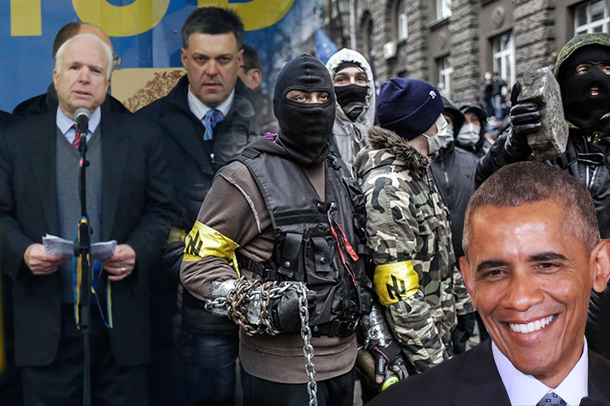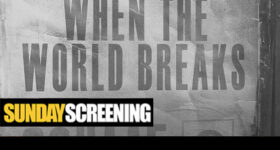Ever since the US-backed Euro Maidan ‘revolution’ in 2014, 21WIRE has been warning readers of how the United States, led by the Obama Administration and rogue US Senator John McCain, had empowered and intentionally unleashed NeoNazi factions in the Ukraine in order to enforce a hard brand of fascist street politics which has only grown in size and influence to this day. This was Washington’s ‘X factor’ for achieving regime change in Kiev.
U.S. corporate media spent years dismissing the role of neo-Nazis in Ukraine’s 2014 coup but it is suddenly going through a conversion, as Daniel Lazare from Consortium News reports…

Last month a freelance journalist named Joshua Cohen published an article in The Washington Post about the Ukraine’s growing neo-Nazi threat. Despite a gratuitous swipe at Russia for allegedly exaggerating the problem (which it hasn’t), the piece was fairly accurate.
Entitled “Ukraine’s ultra-right militias are challenging the government to a showdown,” it said that fascists have gone on a rampage while the ruling clique in Kiev closes its eyes for the most part and prays that the problem somehow goes away on its own.
Thus, a group calling itself C14 (for the fourteen-word ultra-right motto, “We must secure the existence of our people and a future for white children”) not only beat up a socialist politician and celebrated Hitler’s birthday by stabbing an antiwar activist, but bragged about it on its website. Other ultra-nationalists, Cohen says, have stormed the Lvov and Kiev city councils and “assaulted or disrupted” art exhibits, anti-fascist demos, peace and gay-rights events, and a Victory Day parade commemorating the victory over Hitler in 1945.
Yet nothing has happened to stop this. President Petro Poroshenko could order a crackdown, but hasn’t for reasons that should be obvious. The U.S.-backed “Euromaidan” uprising not only drove out former president Viktor Yanukovych in February 2014, who had won an OSCE-certified election, but tore the country in two, precisely because ultra-rightists like C14 were in the lead.
When resistance to the U.S.-backed coup broke out in Crimea and parts of the country’s largely Russian-speaking east, the base of Yanukovych voters, civil war ensued. But because the Ukrainian army had all but collapsed, the new, coup government had no one to rely on other than the neo-fascists who had helped propel it to power.
So an alliance was hatched between pro-western oligarchs at the top – Forbes puts Poroshenko’s net worth at a cool $1 billion – and neo-Nazi enforcers at the bottom. Fascists may not be popular. Indeed, Dmytro Yarosh, the fire-breathing leader of a white-power coalition known as Right Sector, received less than one percent of the vote when he ran for president in May 2014.
But the state is so weak and riddled with so many ultra-rightists in key positions – Andriy Parubiy, founder of the neo-Nazi Social-National Party of Ukraine, is speaker of the parliament, while ultra-rightist Arsen Avakov is minister of the interior – that the path before them is clear and unobstructed. As Cohen points out, the result is government passivity on one hand and a rising tide of ultra-right violence on the other. In the earlier stages of the civil war, for instance, the rightwing extremists burned more than 40 people alive in a labor union building in Odessa, a horrific incident downplayed by Western media.
Confusing its Readers
Cohen’s article may have Washington Post readers scratching their heads for the simple reason that the paper has long said the opposite. Since Euromaidan, the Post has toed the official Washington line that Vladimir Putin has exaggerated the role of the radical right in order to discredit the anti-Yanukovych revolt and legitimize his own alleged interference.
Sure, anti-Yanukovych forces had festooned the Kiev town hall with a white supremacist banner, a Confederate flag, and a giant image of Stepan Bandera, a Nazi collaborator whose forces killed thousands of Jews during the German occupation and as many as 100,000 Poles. And yes, they staged a 15,000-strong torchlight parade in Bandera’s honor and scrawled an SS symbol on a toppled statue of Lenin. They also destroyed a memorial to Ukrainians who had fought on what Bandera supporters regard as the wrong side of World War II, that is, with the Soviets and against the Axis.
But so-called responsible, mainstream journalists are supposed to avert their eyes to avoid being tarred as a “useful idiot” whom Putin supposedly employs to advance his “anti-American agenda.” Ten days after Yanukovych’s departure, the Post dutifully assured its readers that Russian reports of “hooligans and fascists” had “no basis in reality.”
A week or so later, it said “the new government, though peppered with right-wing politicians, is led primarily by moderate, pro-European politicians.” A few weeks after that, it described Bandera as no more than “controversial” and quoted a Kiev businessman as saying: “The Russians want to call him a fascist, but I feel he was a hero for our country. Putin is using him to try to divide us.”
Thus, the Post and other corporate media continued to do its duty by attacking Putin for plainly saying “the forces backing Ukraine’s government in Kiev are fascists and neo-Nazis.” But who was wrong?
The New York Times was no better. It assailed Russia for hurling “harsh epithets” like “neo-Nazi,” and blamed the Russian leader for “scaremongering” by attributing Yanukovych’s ouster to “nationalists, neo-Nazis, Russophobes, and anti-Semites.” The Guardian’s Luke Harding – a leading Putin basher – said of the far-right Svoboda Party:
“Over the past decade the party appears to have mellowed, eschewing xenophobia, academic commentators suggest. On Monday, the U.S. ambassador in Kiev, Geoffrey Pyatt, said he had been ‘positively impressed’ by Svoboda’s evolution in opposition and by its behavior in the Rada, Ukraine’s parliament. ‘They have demonstrated their democratic bona fides,’ the ambassador asserted.”
This is the party whose founder, Oleh Tyahnybok, said in a 2004 speech that “a Moscow-Jewish mafia” was running the Ukraine and that Bandera’s followers “fought against the Muscovites, Germans, Jews and other enemies who wanted to take away our Ukrainian state.” Had the leopard really changed its spots, according to Pyatt? Or was it simply a matter of America not giving a damn as long as Svoboda joined the fight to encircle Russia and advance NATO’s drive to the east?
As someone named Marx once observed, “Who you gonna believe, me or your own two eyes?” As far as Ukraine was concerned, the answer for the corporate press came from the U.S. State Department. If Foggy Bottom said that Ukrainian neo-Nazism was a figment of Russia’s imagination, then that’s what it was, regardless of evidence to the contrary.
Someday, historians will look back on Euromaidan Ukraine as one of the looniest periods in western journalism – except, of course, for all the ones that have followed. But if one had to choose the looniest story of all, one that best reflects the abject toadyism of the reporting classes, it would have to be “Why Jews and Ukrainians Have Become Unlikely Allies,” a 1,400-word article that ran on the Post-owned Foreign Policy website in May 2014. Four years later, it stands as a model of how not to write about an all-important political crisis.
Cohen’s Conversion
The piece begins with the usual hand-wringing about Svoboda and Right Sector and expresses remorse that the latter still venerates the “controversial” Bandera, whose followers “fought on the side of the Nazis from 1944 until the end of World War II.” (Actually, they welcomed the Germans from the start and, despite rocky relations with the Slav-hating Nazis, continued to work with them throughout the occupation.)
But then it gets down to business by asserting that as bad as Ukrainian nationalists may be, Russia is doubly worse. “Despite the substantial presence of right wing nationalists on the Maidan during the revolution,” it says, “many in Ukraine’s Jewish community resent being used by Putin in his propaganda war.” The proof is an open letter signed by 21 Ukrainian Jewish leaders asserting that the real danger was Moscow.
“We know that the political opposition consists of various groups, including some that are nationalistic,” the letter declared. “But even the most marginal of them do not demonstrate anti-Semitism or other forms of xenophobia. And we certainly know that our very few nationalists are well-controlled by civil society and the new Ukrainian government – which is more than can be said for the Russian neo-Nazis, who are encouraged by your security services.”
This was music to Washington’s ears. But if neo-Nazis are free of “anti-Semitism or other forms of xenophobia,” how does one explain the white-power symbols in the Kiev town hall? If nationalists were “very few” in number, why did journalists need to explain them away? If Russian security forces really encouraged neo-Nazis, where were the torchlight parades and portraits of Bandera-like collaborators hanging from public buildings in Moscow?
The article might have noted that Josef Zissels, the Jewish community leader who organized the letter, is a provocative figure who has long maintained close relations with Ukraine’s far right. A self-styled Zhydobanderivets – a word that roughly translates as “Kike follower of Bandera” – he has since infuriated other Jewish leaders by criticizing California Congressman Ro Khanna for sending a letter to the State Department asking that pressure be brought on the governments of Poland and Ukraine to combat Holocaust revisionism in their countries.
Forty-one Jewish leaders were so angry, in fact, that they sent out a letter of their own thanking Khannna for his efforts, expressing “deep concern at the rise of anti-Semitic incidents and expressions of xenophobia and intolerance, including attacks on Roma communities,” and “strongly proclaim[ing] that Mr. Iosif Zissels and the organization VAAD do not represent the Jews of Ukraine.” A Jewish community leader in Russia was so outraged by the pro-Bandera apologetics of Zissels and a Ukrainian-Jewish oligarch named Igor Kolomoisky that he said he wanted to hang both men “in Dnepropetrovsk in front of the Golden Rose Synagogue until they stop breathing.”
So Foreign Policy used a highly dubious source to whitewash Ukraine’s growing neo-Nazi presence and absolve it of anti-Semitism. As crimes against the truth go, this is surely one of the worst. But now that the problem has gotten too big for even the corporate media to ignore, overnight muckrakers like Joshua Cohen are seeing to it that getting away with such offenses will no longer be so easy. Before his abrupt about-face, the author of that misleading Foreign Policy piece was Joshua Cohen.
***
Author Daniel Lazare is the author of The Frozen Republic: How the Constitution Is Paralyzing Democracy (Harcourt Brace, 1996) and other books about American politics. He has written for a wide variety of publications from The Nation to Le Monde Diplomatique, and his articles about the Middle East, terrorism, Eastern Europe, and other topics appear regularly on such websites as Jacobin and The American Conservative.
This article was originally published at Consortium News.
READ MORE UKRAINE NEWS AT: 21st Century Wire Ukraine Files
SUPPORT 21WIRE – SUBSCRIBE & BECOME A MEMBER @21WIRE.TV














